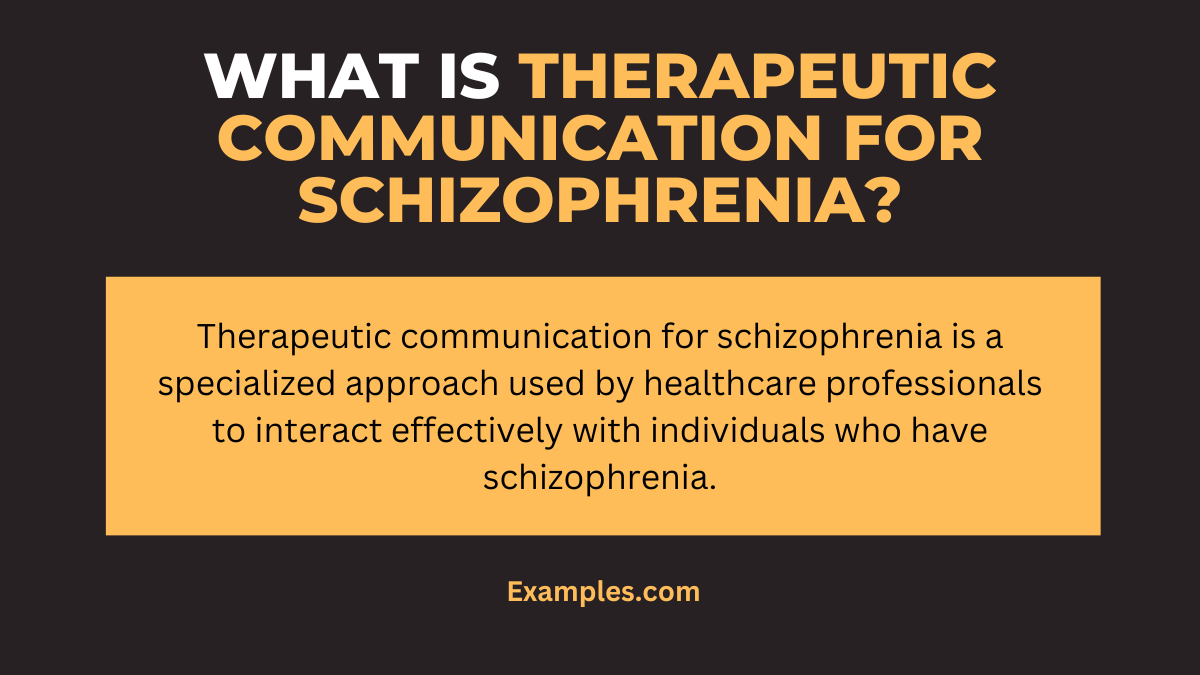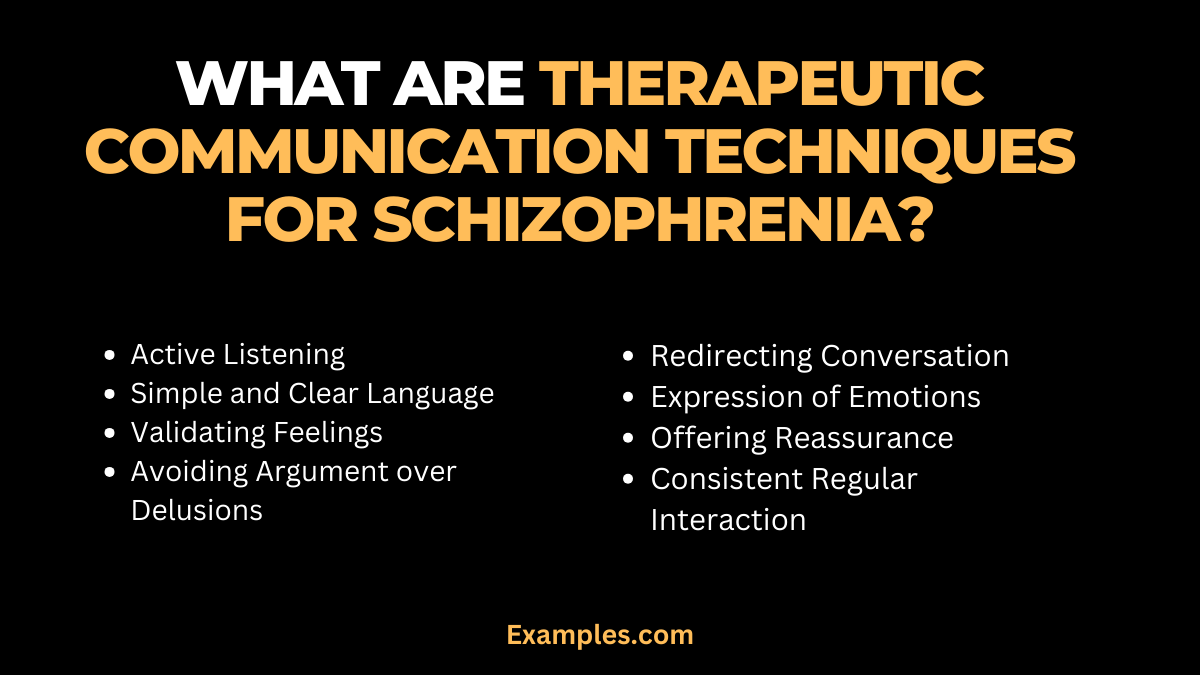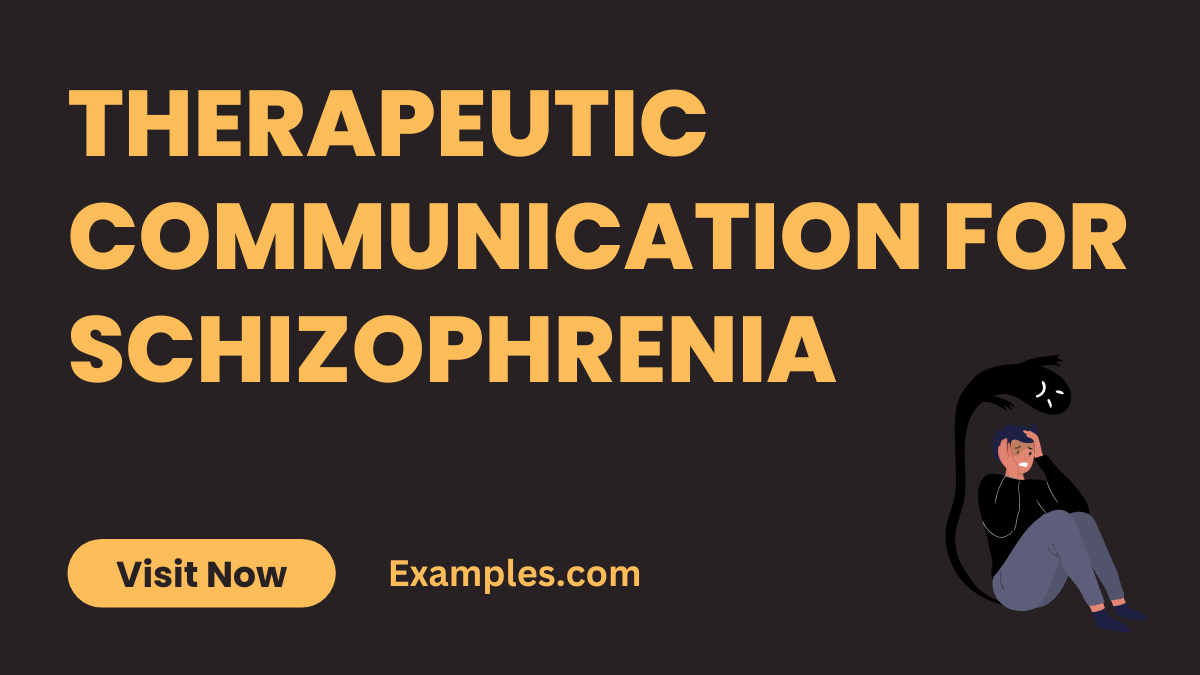10 Therapeutic Communication for Schizophrenia Examples
Explore the Essentials of Therapeutic Communication for Schizophrenia. Delve into effective strategies and illustrative examples that empower healthcare professionals to engage meaningfully with schizophrenia patients. Enhance your understanding of empathetic listening and compassionate dialogue to foster trust, ease symptoms, and improve outcomes. This guide is an invaluable resource for anyone looking to refine their communication skills in mental health care.
What is Therapeutic Communication for Schizophrenia?

Therapeutic communication for schizophrenia is a specialized approach used by healthcare professionals to interact effectively with individuals who have schizophrenia. This communication style is focused on building trust, understanding, and rapport. It involves using clear and simple language, avoiding metaphors or abstract concepts that might be confusing. The goal is to help patients feel heard and supported, enhancing their ability to manage and cope with their symptoms. This type of communication also plays a crucial role in reducing misunderstandings and helping patients navigate their daily lives more effectively.
What are the Therapeutic Communication Activities for Schizophrenia?
Therapeutic communication activities for schizophrenia are designed to engage patients in meaningful interaction, enhancing their ability to communicate and connect with others.
Reality Orientation Activities
Engaging in reality orientation activities helps patients distinguish between reality and delusions, a key step in managing schizophrenia.
Social Skills Training
Training in social skills improves patients’ ability to interact effectively and comfortably in social settings.
Cognitive Behavioral Activities
These activities focus on altering distorted thinking patterns, crucial for patients with schizophrenia.
Art and Music Therapy
Incorporating art and music therapy provides non-verbal outlets for expression and emotional regulation.
Group Discussions
Facilitated group discussions allow patients to share experiences and learn from others in a supportive environment.
Role-playing Exercises
Role-playing exercises help patients practice and improve their communication and social interaction skills.
Journaling
Encouraging journaling as an activity aids in self-reflection and expression of thoughts and feelings.
Mindfulness and Relaxation Techniques
Mindfulness and relaxation techniques are essential in helping patients manage stress and anxiety, common challenges in schizophrenia.
What are Therapeutic Communication Techniques for Schizophrenia?

Therapeutic communication techniques for schizophrenia involve specific methods tailored to address the unique communication challenges faced by individuals with this condition.
Active Listening
Active listening involves giving full attention to the patient, an essential technique in establishing trust and understanding.
Simple and Clear Language
Using simple and clear language helps in preventing misunderstandings and ensures effective communication with patients.
Validating Feelings
Acknowledging and validating patients’ feelings is crucial in building rapport and fostering a therapeutic relationship.
Avoiding Argument over Delusions
It’s important to avoid arguing over delusions, instead, focusing on understanding the patient’s experience.
Redirecting Conversation
Redirecting conversation away from delusional topics to reality-based subjects helps in maintaining productive interactions.
Encouraging Expression of Emotions
Encouraging patients to express their emotions aids in better understanding their state of mind and providing appropriate support.
Offering Reassurance
Providing reassurance can be comforting to patients, especially when they experience anxiety or fear.
Consistent and Regular Interaction
Maintaining consistent and regular interactions helps in building a sense of security and routine for patients.
How to Build a Therapeutic Communication Relationship with a Schizophrenic Patient?
Building a therapeutic communication relationship with a schizophrenic patient involves understanding their unique needs and adapting communication strategies accordingly. This process is crucial for effective treatment and support.
Establish Trust
Establishing trust is foundational. Demonstrating consistency and reliability helps patients feel secure and more open to communication.
Use Clear and Simple Language
Employ clear and simple language to avoid confusion and help the patient understand important information about their treatment and care.
Be Patient and Non-Judgmental
Showing patience and a non-judgmental attitude is essential. It fosters a safe environment for the patient to express themselves.
Validate Their Feelings
Acknowledging and validating the patient’s feelings helps in building a strong therapeutic bond, even if their perceptions might be influenced by their condition.
Active Listening
Active listening shows that you value the patient’s thoughts and feelings, which is critical in understanding their perspective.
Encourage Open Expression
Encouraging patients to openly express their thoughts and fears helps in identifying their needs and addressing them effectively.
Maintain Realistic Expectations
Setting realistic expectations about treatment outcomes helps in building a mutual understanding and preventing potential disappointments.
Avoid Arguing about Delusions
Instead of arguing about delusions or hallucinations, acknowledge their experience and redirect the focus towards reality-based topics.
Tips for Effective Therapeutic Communication Treatment for Schizophrenia?
Effective therapeutic communication treatment for schizophrenia requires specialized techniques to support the patient’s unique mental health needs.
Consistent Communication
Consistent communication helps in building a routine that schizophrenic patients can rely on, reducing their anxiety.
Nonverbal Cues
Utilize positive nonverbal cues like nodding and maintaining appropriate eye contact to convey empathy and understanding.
Create a Calm Environment
A calm and predictable environment can help in reducing stress and confusion for the patient.
Encourage Self-Expression
Encouraging self-expression, whether through words, art, or other mediums, can be therapeutic and revealing.
Regular Check-ins
Regular check-ins convey care and allow monitoring of the patient’s progress and mental state.
Collaborative Decision-Making
Involving patients in decisions about their treatment enhances their sense of control and engagement.
Educate about the Condition
Educating patients about schizophrenia empowers them with knowledge and helps in managing their expectations.
Crisis Management Plan
Having a clear crisis management plan in place ensures safety and preparedness for any challenging situations.
In summary, effective therapeutic communication in schizophrenia treatment involves establishing trust, active listening, empathy, clear language, a calm environment, encouraging self-expression, patience, and offering reassurance and support.
In conclusion, mastering therapeutic communication for schizophrenia is a vital skill for healthcare providers. It not only enhances patient care but also plays a crucial role in the overall treatment and recovery process. The key is to remain patient, empathetic, and consistent, always prioritizing the patient’s perspective and emotional well-being.
For more information on effective communication strategies in mental health care, the American Psychiatric Association provides valuable resources and guidelines. Additionally, the National Institute of Mental Health offers comprehensive material on understanding and supporting individuals with schizophrenia.
These resources can provide further depth and context, helping healthcare professionals and caregivers alike to refine their communication skills and better support those living with schizophrenia.



